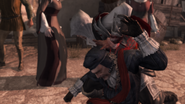(Undo revision 265158 by 90.185.111.117 (talk)) |
No edit summary |
||
| (30 intermediate revisions by 19 users not shown) | |||
| Line 1: | Line 1: | ||
| − | {{Era| |
+ | {{Era|Occupations}} |
| + | {{Assassify}} |
||
| − | [[File:Official.png|250px|right]] |
||
| − | {{ |
+ | {{Quote|You can hunt those who bear false witness against you. They traded dignity for coin. Their loss would not be mourned.|[[Paola]] speaking to Ezio Auditore about officials.|Assassin's Creed II}} |
| + | [[File:Official.png|200px|right|thumb|An official displaying a wanted poster of Ezio Auditore]] |
||
| ⚫ | |||
| ⚫ | During the [[Renaissance]], if [[Ezio Auditore da Firenze]] committed an illegal act in an [[Italy|Italian]] city, officials, who were respected members of society, would accept [[Templars|Templar]] bribes and begin to falsely declare that they had personally witnessed him committing those acts.<ref name="AC2">''[[Assassin's Creed II]]''</ref><ref name="ACB">''[[Assassin's Creed: Brotherhood]]''</ref> |
||
| ⚫ | |||
| ⚫ | As his [[Social Stealth#Renaissance|notoriety]] grew, Ezio would often seek out officials and assassinate them to silence their testimonies. However, most of the officials throughout Italy were paranoid and would flee upon sight of the Assassin, unless he was [[blending]] with nearby [[civilians]].<ref name="AC2" /><ref name="ACB" /> |
||
| ⚫ | |||
| ⚫ | |||
| ⚫ | |||
| + | In [[New Orleans]], [[Aveline de Grandpré]] had to deal with witnesses in a similar vein, since they would spread word of her aristocratic guise's illegal acts. Due to their paranoia, witnesses were difficult to eliminate without attracting further attention and always possessed a pair of bodyguards that deterred Aveline if she was spotted. As such, utilizing discreet weapons including the [[blowpipe]] or the [[parasol gun]] would achieve greater success than a full-on assault.<ref name="AC3L">''[[Assassin's Creed III: Liberation]]''</ref> |
||
| ⚫ | |||
| + | |||
| + | During the [[Golden Age of Piracy]] in the [[Caribbean]], officials were naval officers who could be bribed by [[Edward Kenway]] to decrease his wanted level. They were no longer assassination targets, and could be easily found on the docks of any city, fort or inhabited island. |
||
==Trivia== |
==Trivia== |
||
| ⚫ | |||
| − | *Officials, along with [[Heralds]], are involved in the [[Social Stealth]] system. Killing one will lower your notoriety by 75% (50% in ''Revelations''). |
||
| − | *Officials |
+ | *Officials in Constantinople wore the same clothes as [[Banks|bankers]]. |
| + | *Caribbean officials wore the same uniform of a French soldier. |
||
| ⚫ | |||
==Gallery== |
==Gallery== |
||
| − | <gallery captionalign=" |
+ | <gallery captionalign="center" position="center"> |
| − | + | LL 3 v.png|Ezio assassinating an official |
|
| − | AssassinsCreedIIGame_2010-06-13_11-45-31-58.jpg|Ezio "reasoning" with an official. |
||
</gallery> |
</gallery> |
||
| − | == |
+ | ==References== |
| + | {{Reflist}} |
||
| − | *''[[Assassin's Creed II]]'' |
||
| ⚫ | |||
| − | *''[[Assassin's Creed: Brotherhood]]'' |
||
| ⚫ | |||
| − | *''[[Assassin's Creed: Revelations]]'' |
||
| − | |||
| ⚫ | |||
| ⚫ | |||
{{ACR}} |
{{ACR}} |
||
| + | |||
| − | [[Category:Assassin's Creed II Gameplay]] |
||
| + | [[uk:Чиновники]] |
||
| − | [[Category:Assassin's Creed: Brotherhood Gameplay]] |
||
| − | [[Category: |
+ | [[Category:Occupations]] |
Revision as of 12:03, 2 July 2019

|
What if this was all a construction? A masterfully crafted simulation? This article contains explicit references to the Assassin's Creed series in a real-world context, is written in the literary present tense, or is written in terms of gameplay in the incorrect section(s). Out-of-universe content should be confined to the "behind the scenes" section, and content in the body should be written in the historical past tense. Please revise the relevant section(s) to conform with an in-universe perspective. |
An official displaying a wanted poster of Ezio Auditore
Officials were minor assassination targets who falsely claimed to have witnessed crimes committed by the Assassins and testified against them.
During the Renaissance, if Ezio Auditore da Firenze committed an illegal act in an Italian city, officials, who were respected members of society, would accept Templar bribes and begin to falsely declare that they had personally witnessed him committing those acts.[1][2]
As his notoriety grew, Ezio would often seek out officials and assassinate them to silence their testimonies. However, most of the officials throughout Italy were paranoid and would flee upon sight of the Assassin, unless he was blending with nearby civilians.[1][2]
In Constantinople, during the 16th century, officials would stay and combat Ezio should they spot him, and were always accompanied by a pair of Byzantine militia.[3]
In New Orleans, Aveline de Grandpré had to deal with witnesses in a similar vein, since they would spread word of her aristocratic guise's illegal acts. Due to their paranoia, witnesses were difficult to eliminate without attracting further attention and always possessed a pair of bodyguards that deterred Aveline if she was spotted. As such, utilizing discreet weapons including the blowpipe or the parasol gun would achieve greater success than a full-on assault.[4]
During the Golden Age of Piracy in the Caribbean, officials were naval officers who could be bribed by Edward Kenway to decrease his wanted level. They were no longer assassination targets, and could be easily found on the docks of any city, fort or inhabited island.
Trivia
- Officials always carried some currency, which could be looted from their bodies after killing them. However, they rarely possessed anything else.
- Officials in Constantinople wore the same clothes as bankers.
- Caribbean officials wore the same uniform of a French soldier.
Gallery
References
| |||||||||||||||||||||||||||||||||||||
| |||||||||||||||||||||||||||||||||||||

